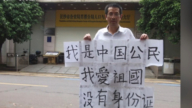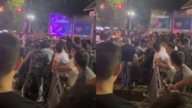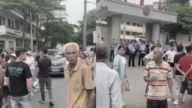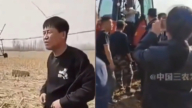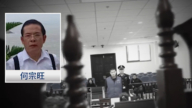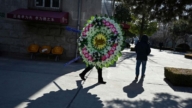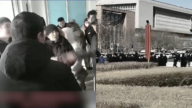【新唐人2013年11月22日訊】中國有這樣一種人——「透明者」,無論是郵件、行蹤還是電話,都處在政府的監控中,他們的生活完全透明。目前無法統計,有多少人正受到監視,甚至沒有辦法了解到是哪些部門在負責這項任務,而「透明者」在中國為數不少。
美國《紐約時報》當地時間11月20號,發表署名慕容雪村的文章說,北京電影學院教授、異見人士郝建,幾乎每個月都被警方請去「喝一次茶」。而這種「茶」是不可以隨便拒絕喝的。
文章指出,在一次「喝茶」時,警察告訴郝建:「對我來說,你的生活是完全透明的。」
1989年的北京天安門事件中,郝建的堂弟不幸中彈身亡,之後,郝建還參加過六四座談會等一些被中共禁止的活動。從此,郝建便成了警方關注的對象,他們會監聽郝建的電話,查看他的郵件,還時常跟蹤他。在某些特定的時刻,還會禁止他出境。
慕容雪村說,像郝建這樣的「透明者」,在中國大陸不在少數,在他熟識的人中,就有數十人被迫享受著這樣的待遇。他還透露,政府還監視著家庭教會的組織者、法輪功學員、上訪的民眾。到底有多少人正受到監視,是哪些部門在負責這項任務,都沒有辦法知道。
文章還說,近幾年來,中共當局對中國大陸民眾實施的監控程度日益嚴重,攝像頭的安裝已達到無所不在的地步。
中國在「城市監控」上,走在世界前列。新疆媒體宣稱,烏魯木齊的攝像頭具高解析度,防砸防燒,採用定焦和360度可旋轉,並配以紅外線夜間監視功能。
2010年7月,中共在新疆首府烏魯木齊安裝了四萬多個攝像頭,密佈在公交車、車站、學校、幼兒園和商場超市等。新疆官方聲稱,還將安裝更多的攝像頭,以建立起覆蓋整個烏魯木齊市區的視頻監控系統,尤其要對重點地區實現「無縫覆蓋」。
時事評論員 林子旭:「中共密密麻麻安裝了這麼多攝像頭,究其原因就兩個字﹕恐懼。一個正常社會的攝像頭是被用來監控罪犯,以此來保障社會安定的,中共的攝像頭則是被用來監控民眾,以此來穩固中共的權利的。」
新疆軍區職工郭中元的遺孀,在長達四十年代替丈夫上訪的過程中,曾三次被關進監獄。風燭殘年的魏群英,被列為維穩對象,24小時受監控。
大陸「權利運動」負責人胡軍:「我們現在這個小區,到處都是攝像頭,一出樓門,旁邊就是一個大的攝像頭,對面也一個,三、四個攝像頭。一些親戚朋友來家裏,他們都要去問,這個人是哪裏的﹖你為甚麼要到他那去﹖搞的親人們都覺得莫名其妙,朋友之間都沒有辦法去往來,這樣的事情經常發生。」
目前旅居美國的法輪功學員劉女士,曾經居住在中國的北京,當時她懷疑自己家被監控。
旅美法輪功學員 劉女士:「04年我從勞教所出來不久,我就想看我的父親,等我收拾行李完,警察就進到我家,就問我去哪裏,跟我說你如果要離開北京,就必須要寫申請書,為甚麼警察會知道我去哪裏呢﹖並且是我剛剛收拾行李,他就知道了。」
今年5月,江蘇無錫維權人士王建芬透露,「海南萬寧幼女案」受害女童家長正面臨極大壓力,被全方位監控,並遭到明確的威脅說:你到哪裏、你跟誰見面、你所說的話,我們都知道。
慕容雪村表示,作為一名關心時事的作家,他常常懷疑自己也被跟蹤,被錄音、錄像。
林子旭指出,中共口口聲聲說安裝這些攝像頭是為了民眾的安全,事實卻是﹕觸及中共統治時,這些攝像頭就睜大了眼睛﹔關係到民眾利益時,這些攝像頭就睜一只眼、閉一只眼。林子旭舉例,他說﹕年初在吉林嬰兒失蹤案件中,幾萬個攝像頭「集體失明」,就足以說明中共的態度和問題。
採訪編輯/常春 後製/孫寧
The “Transparent" People in China
In China, there are “transparent" people.
They live a transparent life, in which their mails,
whereabouts, and phones are under surveillance
by the Communist regime.
The number of these people is unknown, and those
in charge of the surveillance are also unknown.
What is known is that there are many of them.
On Nov. 20 the Chinese writer Murong Xuecun published,
in the New York Times Chinese print, that Hao Jian,
a professor at the Beijing Film Academy and government
critic, is politely asked by the police “to have a cup of tea
about once a month."
Accordingly, this “tea" cannot be rejected.
“To me, your life is totally transparent", a police officer told
Mr. Hao during one of his recent chats, wrote the article.
Hao Jian’s cousin was shot and killed
in the 1989 Beijing Tiananmen massacre.
Mr. Hao, a participant in 1989 Tiananmen Square massacre
forums, has since been targeted by the police.
They “tap his phone, read his email and follow him."
“On special occasions, … the government forbids him
to leave China", he says.
According to Murong Xuecun, dozens of his acquaintances
are compelled to lead transparent lives.
He revealed that the authorities also watch organizers
of church services held in private homes,
Falun Gong practitioners and simple petitioners.
It is unknown how many people are under surveillance
and which agency oversees the task.
In recent years, the Communist regime surveillance effort
has gone wide and deep as stated in the article.
“China is blanketed with surveillance cameras", it reads.
China tops the world in ‘urban surveillance’.
Xinjiang media claimed that Urumqi is equipped with
high resolution cameras, anti-smashing, anti-burn,
auto-focus, 360 degree-rotation,
and infrared night monitoring function.
July 2010, Xinjiang capital Urumqi was installed with more
than forty thousand cameras on buses, in railway stations,
schools, kindergartens, shopping centers, and supermarkets.
Xinjiang authorities claim more cameras will be installed
to cover the entire city, and ensure “seamless coverage"
in key areas.
Lin Zixu, commentator: “The many cameras only
reflects the fear of the CCP.
Surveillance cameras in a normal society
are for offenders and social security.
The cameras in China are for the general public
and the regime security."
Wei Qunying is Xinjiang Military District Staff member
Guo Zhongyuan’s widow.
She has petitioned for her husband for the past
four decades and was jailed three times.
The 70-year-old woman is the object of the stability
maintenance and is under surveillance 24 hours a day.
Hu Jun, the organizer of Human Rights Campaign in China:
“Where I live, there are cameras everywhere.
Outside of the apartment, there is a big camera by the door,
there’s another one next door,
and three or four across the street.
They always question visitors about who they are
and why they are coming.
People are baffled. You can’t have a normal life.
It happens frequently."
Ms. Liu is Falun Gong practitioner residing in the U.S.
She suspected that her house was being monitored
when she lived in Beijing.
Ms. Liu, a Falun Gong practitioner from China: “I wanted
to visit my father after I got out of the labor camp.
Immediately after I was done packing, the police came
and asked where I was going.
He indicated that I must apply before I leave Beijing.
How would the police know that I was leaving?
I had just finished packing and he knew already."
Wang Jianfen is an activist from Wuxi, Jiangsu.
In May this year, she revealed that the victims of the “Hainan
Wanning sex case" have been under tremendous pressure.
The authorities conduct comprehensive surveillance on them
and threaten, “Wherever you go, whomever you meet,
and whatever you say, we know all about it."
Murong Xuecun wrote, “As an outspoken writer,
I have become paranoid.
I often suspect that I am being followed and videotaped."
Lin Zixu points out that authorities claimed that the cameras
are for the safety of the people, but in fact they are
for the convenience of the Communist ruling.
They watch closely when it matters to the regime,
and shut their eyes when it matters to the people.
For example, he says, “Tens of thousands of cameras
suddenly went blind on the missing baby in Jilin.
That explains the attitude and the problems
of the Communist regime."
Interview & Edit/ChangChun Post-Production/LiYong



